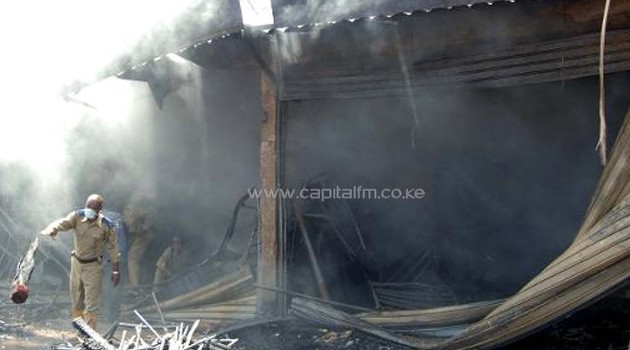
A fire officer removes debris at the scene of a fire at a popular market in the Sudanese capital Khartoum, on September 29, 2013/AFP
JUBA, Oct 9 – A slither of barren territory left in limbo following the divorce of the two Sudans is threatening to upset the uneasy peace between the old foes.
Wedged between Sudan and newly independent South Sudan, the volatile Abyei region had been scheduled to hold a referendum on its future but plans for a vote have stalled again amid mounting tensions.
A failure to resolve the status of the region could provoke one of the two main communities in the area to unilaterally jump to one side or the other. And with the area awash with guns after decades of on-off civil war, the consequences could trigger fresh violence.
“The security situation and the status quo in the Abyei Area are becoming increasingly untenable,” UN chief Ban Ki-Moon said in a September report to the Security Council, sounding the alarm over the dispute.
At first sight Abyei appears to be of little interest. There are a handful of crumbling buildings scattered around baking scrubland. The bullet scars gouged into walls mark the repeated rounds of savage conflict fought there.
But it remains the most sensitive issue left unresolved when South Sudan won independence in 2011.
Patrolled by some 4,000 Ethiopian led UN peacekeepers, the Lebanon sized area is home to the settled Ngok Dinka, closely connected to South Sudan, as well the semi nomadic Arab Misseriya, who traditionally move back and forth from Sudan grazing their cattle.
Abyei was meant to vote whether it lies in Sudan or South Sudan in January 2011 the same day as Juba voted overwhelmingly to split from the north as part of the 2005 peace deal which ended Sudan’s two decades long civil war.
But that vote never happened and Sudanese troops stormed the enclave and occupied it until May 2012. Since then, the impoverished area has been in political limbo.
The African Union has proposed that a referendum be held this month, but little if any progress has been made.
Risk of unilateral allegiance grows
“There is little chance of a referendum in the near future,” the Small Arms Survey, a Swiss-based conflict research group, said in a recent report, noting that Khartoum would likely ignore any AU pressure.
Once oil rich but with production tailing off, Abyei nevertheless remains a key area of emotional and symbolic significance.
Influential leaders in both nations come from ethnic groups in Abyei, where animosity exacerbated by political rivalries in the capitals is replacing an ancient tolerance that allowed the two communities to share the land.
<!–nextpage–>
The risk of either group unilaterally declaring allegiance for the Ngok Dinka, to be part of South Sudan, and the Misseriya, to Khartoum is growing.
Abyei has seen years of “unfulfilled agreements, deadlocked negotiations, and outbreaks of violence”, the Enough Project, a US based pressure group, warned in a recent report.
“A further delay of the long awaited self determination referendum could catalyse the tense situation and spark widespread violence,” it said.
Last month foreign ministers from both sides met in New York calling, once again, for a “mutually acceptable arrangement”.
Ngok Dinka oppose any joint administration with the Misseriya unless a referendum takes place too, fearing that would ease political pressure on Khartoum and “lead to a stalemate, in which the question of Abyei’s political future is permanently deferred,” the Small Arms Survey think-tank said.
Khartoum opposes any referendum in which the semi nomadic Misseriya don’t vote.
Sudan, meanwhile, has been caught up by deadly riots over fuel prices, the worst protests in the history of President Omar al-Bashir’s two decade rule.
Referendum fate ‘at the crossroad’
Bashir and South Sudanese President Salva Kiir appear for now at least to have reached an understanding on how to move forward and reduce tensions caused by other border disputes and a year long blockade of oil exports from the south.
After meetings in September, diplomats said the two leaders agreed to settle a deal between themselves, rather than opt for a referendum.
Yet Kiir last month also released all government employees who came from Abyei, so that they could return home to vote in a referendum.
“The fate of Abyei referendum is at the crossroad,” wrote Luka Biong Deng, former South Sudanese minister and Ngok Dinka from Abyei, now a fellow at Harvard Kennedy School.
With political stalemate, “the people of Abyei are left with no other option but to self determine the final status of their area.”
For now, Abyei is largely calm, but observers wonder how long an uneasy peace will last.
“There are certainly voices in Juba who believe that an armed clash between Misseriya and Dinka Ngok is very likely,” said John Ashworth, a prominent expert on the Sudans.
The view in Juba, he said, was that “it could easily lead to Sudan and South Sudan being sucked back in to a broader war.”














































